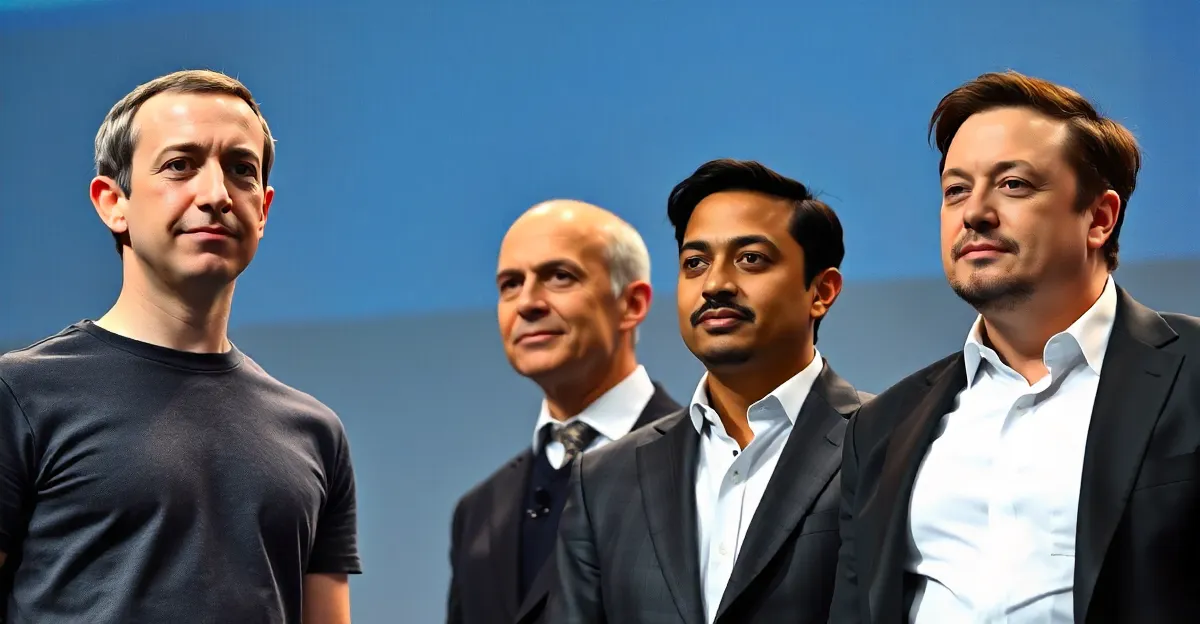
In an era of shifting political tides, corporate America finds itself navigating uncharted waters, with one name looming large: Donald Trump. As the former president’s potential return to power gains traction, CEOs and industry leaders are grappling with the potential reverberations of his ‘America First’ policies.
A Gathering of Titans
Mark Zuckerberg (Meta), Jeff Bezos (Amazon), Sundar Pichai (Google), Elon Musk (Tesla, SpaceX), and other titans of industry recently converged in Washington D.C., their presence serving as a stark reminder of the intersection of business and politics. As the dust settles on the 2024 election, one question lingers: what do Trump’s policies mean for corporate America?
Trump’s Shadow Looms Large
During Q4 earnings calls, analysts and investors alike homed in on one topic: Trump’s potential return and its implications for business. Mettler-Toledo, a manufacturer of industrial and laboratory equipment, acknowledged the uncertainty, with CFO Sean Fadava admitting, “Geopolitical tensions remain high, and that includes the possibility of new tariffs that we haven’t planned for.”
Mettler-Toledo was not alone. CNBC’s analysis of S&P 500 companies’ earnings calls revealed a surge in mentions of Trump-related keywords, with ‘tariff’ reaching its highest frequency since 2020. New phrases like ‘Gulf of America’ and ‘Dawg’ (short for ‘Digital Asset War Room Government’) have also entered the corporate lexicon, reflecting Trump’s enduring influence.
Tariffs: A Hot Topic
Trump’s tariff plans remain a top concern. The president’s proposed 25% taxes on imports from Mexico and Canada, along with 10% tariffs on Chinese goods and aluminum/steel duties, have companies on edge. Uncertainty is rife, with many CEOs admitting they’ve yet to factor these potential changes into their guidance.
Some companies, like Martin Marietta, have expressed cautious optimism, with CFO Anne Lloyd noting, “We’re monitoring the situation closely, but it’s too early to say how these tariffs will ultimately impact our business.” Others, like Generac and Camden Property Trust, have begun strategizing, acknowledging the potential for price increases and supply chain disruptions.
However, not all companies are concerned. Zebra Technologies CFO Olivier Leoncini sees potential benefits, stating, “Price increases can help alleviate profit pressure,” while BorgWarner’s Craig Arndt warns of decreased demand in some markets. Cisco’s Mark Chandler, however, expresses confidence in the company’s ability to adapt, saying, “We have planned for many scenarios and steps that we can take depending on what actually goes into effect.”
Immigration: A Looming Concern
Immigration has also emerged as a hot topic, with mentions reaching their highest level since 2017. Trump’s pledge to deport millions of immigrants and build a border wall has companies on edge, with some, like Sudden Tools CEO Nicholas Pinchuk, warning of potential labor market shocks and inflation.
AT&T, Verizon, and T-Mobile faced questions about the impact of immigration slowdowns on their businesses, while apartment developer UDR’s Michael Manelis dismisses concerns about rent declines due to deportations. However, Intuitive Surgical CEO Gary Guthart warns of potential labor shortages in Southern California due to deportations.
Tyson Foods CEO Donnie King, however, remains confident in the company’s ability to manage its workforce, stating, “We are confident that we will be able to continue to manage our business successfully.”
Doug and the Gulf: New Priorities
Trump’s return has also brought new topics to the forefront, with ‘Dawg’ (Digital Asset War Room Government) mentioned in over 15 earnings calls. Investors wonder if contracts between public companies and federal agencies could be on the chopping block under a Musk-led team.
Iron Mountain CEO William Meaney expresses optimism about potential government efficiency gains, while Baird Defense Technologies’ Shiham Sancar hopes that Dawg will bring “merit and transparency” to government contracting.
Preparing for Uncertainty
As the business community grapples with the potential impact of Trump’s policies, one thing is clear: uncertainty reigns. Companies are preparing for a range of scenarios, from tariff-induced price increases to labor shortages due to immigration changes. As CEOs like Mettler-Toledo’s Sean Fadava admit, “Geopolitical tensions remain high, and that includes the possibility of new tariffs that we haven’t planned for.”
In this ever-shifting landscape, corporate America is bracing for impact, with eyes fixed on Washington and ears attuned to the whispers of change. Only time will tell how Trump’s policies will reshape the business landscape, but one thing is certain: companies are ready to adapt, innovate, and thrive in the face of uncertainty.




